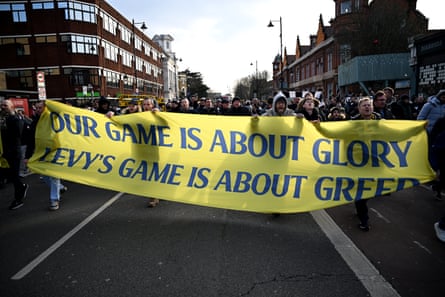Daniel Levy has resigned as Tottenham Hotspur chairman after nearly 25 years. His departure marks the end of an era characterized by transformation and ambitious stadium projects. Despite Europa League success, his final year saw fan protests over trophy droughts. The club confirmed no ownership changes. Levy’s legacy includes the stadium, though his tenure also saw high manager turnover.
In a seismic shift for Tottenham Hotspur, Daniel Levy has resigned from his position as chairman, effective immediately. The announcement brings an end to Levy's nearly 25-year tenure at the helm of the North London club. His departure marks the end of an era characterized by significant transformation, ambitious stadium projects, and a persistent quest for silverware.
Levy, 63, assumed the role of chairman in March 2001, becoming the longest-serving chairman in the Premier League. His reign saw Tottenham evolve from a mid-table team to a consistent challenger for European places, culminating in a Europa League title last season, ending a frustrating 17-year trophy drought for the Spurs faithful.
"Tottenham Hotspur announces that Daniel Levy has today stepped down from his role as executive chairman after nearly 25 years," the club's official statement declared, signaling the dawn of a new chapter at Hotspur Way. The statement emphasized Levy's contribution to the club's growth, highlighting its consistent presence in European competitions and its emergence as a globally recognized footballing brand.
Despite the Europa League triumph, Levy’s final year was marred by growing discontent among a section of the fanbase. Frustration over the club's failure to consistently challenge for major honors, coupled with perceived cautiousness in the transfer market, led to organized protests against Levy's leadership in December 2024 and February 2025. These demonstrations underscored the growing divide between the board and some supporters, adding pressure on Levy as the club navigated a turbulent period.
Levy acknowledged the challenges and expressed his gratitude in the official statement. "I am incredibly proud of the work I have done together with the executive team and all our employees," he stated. "We have built this club into a global heavyweight competing at the highest level. More than that, we have built a community. I was lucky enough to work with some of the greatest people in this sport, from the team at Lilywhite House and Hotspur Way to all the players and managers over the years."
He continued, "I wish to thank all the fans that have supported me over the years. It hasn’t always been an easy journey, but significant progress has been made. I will continue to support this club passionately.” His words serve as a reminder of his continued love for the team despite recent animosity.
While Levy's departure signals a significant change in leadership, the club has confirmed that there will be no alterations to the ownership or shareholder structure. This suggests a continuity of vision at the highest level, even with a new figurehead at the helm. Questions remain regarding the appointment of Levy's successor and the potential impact on the club's future strategy.
In August, Levy reflected on his legacy during an interview on Gary Neville's Overlap podcast. He identified the construction of the Tottenham Hotspur Stadium as his greatest achievement, a state-of-the-art facility that has transformed the matchday experience for fans and provided a significant revenue stream for the club. He also addressed criticism regarding Tottenham's trophy drought, suggesting that his contributions would be better appreciated in hindsight.
Despite the recent Europa League success, Tottenham endured a difficult Premier League campaign last season, finishing 17th after suffering a club-record 22 defeats. This underwhelming performance led to the dismissal of Ange Postecoglou just weeks after the European triumph. The decision highlighted Levy's ruthlessness and his unwavering pursuit of success.
Levy's tenure was characterized by a high turnover of managers, a testament to his demanding expectations. George Graham was the first manager to be sacked during his reign in 2001. Thomas Frank, who replaced Postecoglou, was Levy’s 14th permanent manager at the club. This managerial merry-go-round reflects the constant pressure to deliver results and the challenging environment at Tottenham Hotspur.
As Tottenham enters a new era without Daniel Levy, the club faces both opportunities and challenges. The new chairman will be tasked with building on the foundations laid by Levy, navigating the complexities of modern football, and ultimately delivering the elusive major trophies that have eluded the club for so long.

